Trump team keeps fighting
Between election lawsuits, Alaskan drilling, Israeli-Saudi talks and fiscal stimulus, the outgoing Trump administration has been doing more than just playing golf.
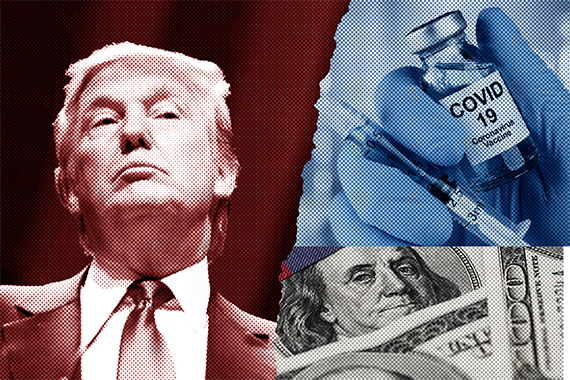
23rd November 2020
Although the headlines suggest that President Trump is spending quite a lot of time on the golf course, his campaign team is still busy fighting a number of rear-guard legal challenges across the swing states. The electoral landscape is only becoming more complicated for President Trump, however, as several states won with slim margins by Mr Biden begin certifying their election results.
Georgia has already done so, though a recount may still occur. Pennsylvania is expected to do so on Monday or Tuesday, with the exception of Philadelphia County, which is unsurprisingly a Biden stronghold and subject to legal challenges. Michigan and Arizona are also due to certify results this Monday. Even if the Pennsylvania and then Wisconsin results, the latter of which will be certified in early December, were swung in favour of Trump, it would not be enough to overturn Biden’s overall victory.
The Trump team’s latest legal strategy appears to be to try and delay the certification of the election results past the 8 December “safe harbour” date. If that date has passed with no official result, then, theoretically, Republican-run state legislatures in the key swing states could appoint Trump-leaning representatives to the Electoral College, which votes on 14 December to confirm the next president. It’s a legal long shot at this stage, but given what 2020 has thrown at the world, we should perhaps make no presumptions.
From a financial markets perspective, US and world markets have already presumed a Biden win and put any volatility over who will be the next US President behind them. The downstream effects of the massive resurgence of Covid-19 cases in the US and Europe, potential US fiscal stimulus, US monetary policy, and the arrival of Covid-19 vaccines are the forces driving financial markets now.
The President stays busy on policy
Beyond contesting the election results, the Trump administration has hardly been idle in what could be its final months. President Trump has ordered the auctioning of oil drilling rights in the Alaskan Wilderness. The challenge for big-oil is likely to be the potential consumer backlash if those rights are won, as well as a world that will still be awash in black gold, even after Covid-19 has been overcome.
The administration announced the potential blacklisting of 89 Chinese companies associated with the Chinese military today, suggesting that no thaw in US/China relations will be happening anytime soon. Ironically, the domestic aviation sector could well suffer as a result. Honeywell, Eaton and General Electric are among the American companies that may now potentially miss out as suppliers of potentially thousands of aircraft orders in China in the future.
It is somewhat ironic that President Trump’s potentially greatest foreign policy triumph could happen in the last days of his presidency. Israeli Prime Minister Benjamin Netanyahu secretly flew to Saudi Arabia over the weekend with US Secretary of State Mike Pompeo to meet with its de facto ruler, Crown Prince Mohammed bin Salman. Establishing diplomatic relations between the two states would be a crowning achievement, following similar breakthroughs with the UAE, Bahrain and Israel. It would also be modestly market positive, though the grouping, nurtured by the United States, has a “my enemy’s enemy is my friend” look about it; that common enemy, of course, being Iran.
Should that come to pass in the next two months, it could complicate, and possibly derail, attempts by the United States to re-engage with Iran. That would be positive for oil prices, as it likely means Iran sanctions will remain and millions of barrels of Iranian crude would remain, officially at least, on the international markets.
With Biden bound for the White House, how will you trade?
Already have a live trading account? It is easy to fund your account using one of the following payment methods






Fiscal stimulus negotiations resume
While the White House continues to be remarkably quiet about the acceleration of the Covid-19 pandemic across the United States, state governments and Republican Senators have not. With movement restrictions being imposed in escalating levels across America, there is a real chance that a double-dip recession could occur as consumer consumption falls markedly. A second wave of job losses due to the above, as Federal programmes run out, creates an even murkier picture.
Initial jobless claims spiked higher last week, breaking a pattern of high, but decreasing weekly claims. That seems to have spurred action on Capitol Hill, with bi-partisan talks resuming on more fiscal stimulus, encouraged by Treasury Secretary Steve Mnuchin. The hope that a second wave of fiscal stimulus will emerge from Washington DC has lifted stock markets, oil and pushed the Dollar lower.
Having believed that stimulus talks were dead and buried after the election, the return of the parties to the negotiating table is a welcome development. We still expect the Federal Reserve to increase monetary stimulus in December, however, regardless of the outcome of talks or the arrival of Covid-19 vaccines.
That’s because fiscal stimulus talks have a mountain to overcome. The White House and Senate Republicans seem more inclined to redistribute the unused lending facilities of the Federal Reserve from the Cares Act, than to actually increase new money coming into the economy. The Republicans are talking $500 billion, the Democrats $2.2 trillion. That is a huge spread to cross for an agreement, and the odds are it will remain insurmountable. After such a poor performance in the election in terms of Senate races, the Democrats now have much less negotiating heft. This is something that will typify the Biden Presidency, and haunt him going forward.
Timing is everything
Timing is everything in the markets, and President Trump can perhaps count himself unlucky. Today, AstraZeneca/Oxford University announced that their Covid-19 vaccine is effective against the virus, joining Pfizer BioNTech and Moderna seeking vaccine approval in the near future. Most importantly, this latest vaccine is both cheaper than its forerunners, and can be stored at near-room temperature.
Although the arrival of vaccines is encouraging, it will not be an immediate game-changer with seven billion people to vaccinate. The world will remain on monetary policy life-support throughout 2021, and that should continue supporting asset prices everywhere.
The President may rue the difference a month would have made to his re-election hopes, and rightly so. Despite the criticism of his handling of the Covid-19 crisis, his legacy may include proactively funding emergency vaccine research to the tune of billions of dollars. And, substantial steps towards peace in the Middle East. He is unlikely to see it that way though.
Jeffrey Halley
Senior Market Analyst, Asia Pacific, OANDA
Jeffrey has three decades of financial market experience. Before joining OANDA, Jeffrey was Director of Trading at Saxo Capital Markets in Singapore. At OANDA, he provides approachable macro analysis of various asset classes with a typically Kiwi viewpoint aimed at demystifying the financial markets for the many, and not the few. Jeffrey holds an MBA from the Cass Business School, and is a regular guest with Bloomberg, BBC, Reuters and Channel NewsAsia.
Exclusive to OANDA
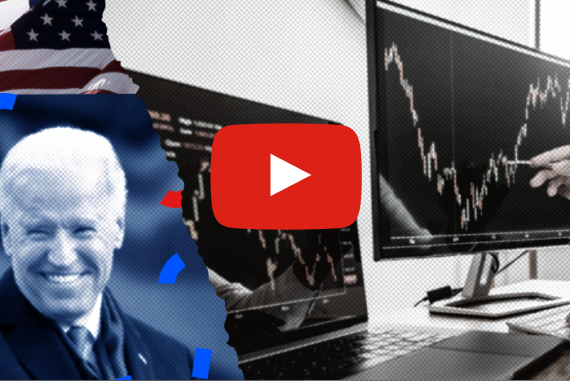
US election impact and market analysis
Market experts examine the impact of Biden’s contentious US election victory and its effect on the financial markets in this ongoing video series.
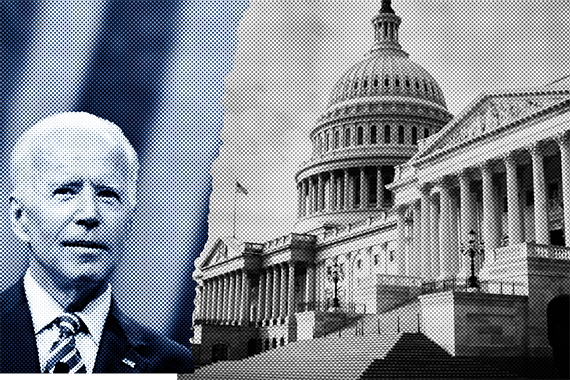
Election win for Biden but Republicans hold Senate
Joe Biden may have won the election thanks to slim margins in key states, but the Democrats lost seats in the House and have failed to hold the Senate.
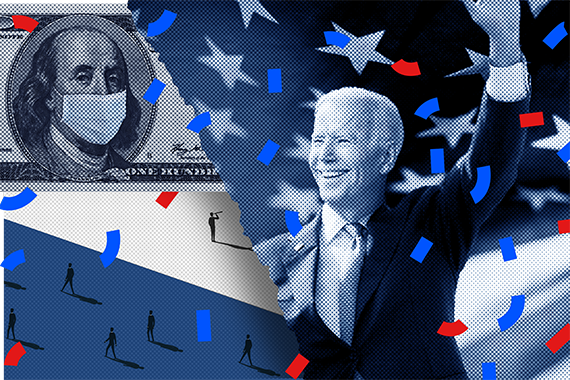
Biden’s ‘blue wave’ is a blue ripple
Joe Biden appears to have won the presidential election thanks to slim margins in a few key states, but the Democrats lost seats in the House and have failed to gain control of the Senate.
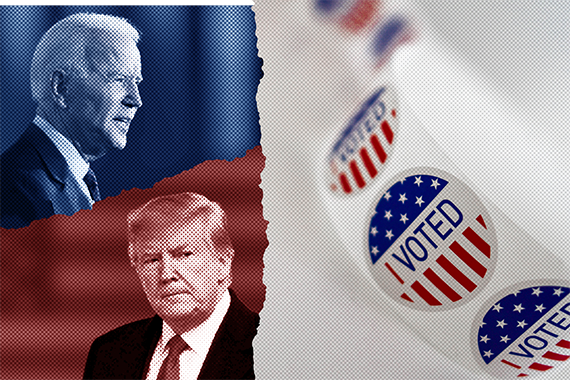
Record turnout could delay winner announcement
While pre-election voting has favoured Joe Biden, the Trump campaign is hoping that a big turnout on Election Day will power him to a second surprise victory.